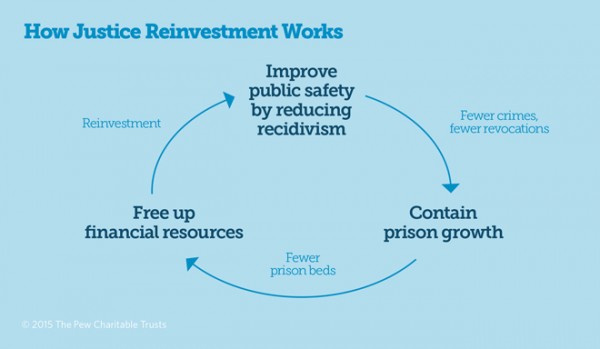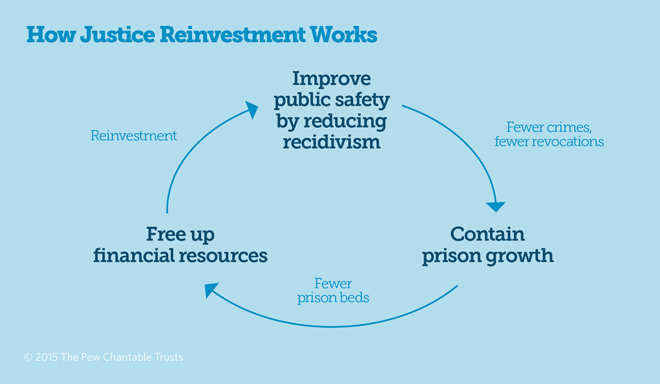 The Justice Reinvestment reform package died at some point late last Friday night, passing the Senate but never making it out of the Judiciary Committee in the House. This was a surprising conclusion to nearly a year of momentum building around the issue of mass probation and mass incarceration, and is indicative of the uphill battle any criminal justice reform measures face. Even in an era where conversations about prison spending are front and center, substantive reform faces the same ‘tough on crime’ hurdles it always has.
The Justice Reinvestment reform package died at some point late last Friday night, passing the Senate but never making it out of the Judiciary Committee in the House. This was a surprising conclusion to nearly a year of momentum building around the issue of mass probation and mass incarceration, and is indicative of the uphill battle any criminal justice reform measures face. Even in an era where conversations about prison spending are front and center, substantive reform faces the same ‘tough on crime’ hurdles it always has.
After a landmark effort to bring together all stakeholders to fix what was commonly referred to as a ‘broken’ system, six pieces of legislation emerged in the spring, with all of them eventually passing the Senate. The compromise legislation was already almost unrecognizable from the far more progressive recommendations made to the Justice Reinvestment Working Group by the research and consulting group, the Council of State Governments. However it was ultimately a strong package that reflected a diverse array of interests and promised meaningful change and improvements. The legislation was a testament to the leadership, hard-work, and collaboration by all branches of the government, and spear-headed by the governor, at tackling the third-rail of criminal justice reform. The group also worked hard to incorporate communities that are so highly impacted by these issues, listening to the concerns of criminal justice advocates, the NAACP, and those directly affected.
Much of the language of the bills essentially codified goals for how to best run probation and sentencing. The importance was just as much about demonstrating a set of ideals and priorities to all stakeholders, such as the judiciary, the public defender, and the attorney general, as mandating change. For example, a section on correctional impact statements would require an estimation on the effect on the DOC budget for any relevant future legislation. Such a change would not require legislation to implement, but the goal was to use statute to compel progress. As another example, a provision allowing police to bring a mentally ill individual to treatment instead of jail permits a decision that could be made by a cop on the street any way, but is encouraged by legally formalizing the process. As a result, the failure of the bills is even more of a two-sided coin: on the one hand, many of the goals can still be implemented even without legislation. On the other hand, the death of legislation so modest and restrained indicates a strong opposition to reform.
Had the package only contained these more rhetorical modifications, it may have passed. But at the same time the bills also succeeded in targeting several concrete, important, and seemingly consensus changes that would have substantively reduced correctional spending. Since these provisions were the only ones that ended up receiving any push-back in committee, it seems possible they were what torpedoed the efforts.
These provisions were nowhere near as ambitious as the major policy goals laid out at the start of the process. Most notably, from the beginning of the Justice Reinvestment Working Group, there was conversation about a cap on probation length. This ultimately morphed into an extremely restricted max for a very small set of charge types that was recommended by the Judiciary as part of the new court rules. None of the more impactful ideas made it into the legislative package.
However, some important though widely supported changes aimed at reducing correctional costs did emerge. These included expanding the criteria for medical parole, which would have enabled greater paroled release of sick and dying inmates. Another important change merely gave the parole board more discretion to impose shorter sentences for parole violations, as requested by the board itself. Another provision created a more formal process for the judiciary to choose to divert criminal cases as it saw fit, another very conditional and discretionary form of reform. Perhaps the most progressive bill, Senate Bill 2935, would have reduced the maximum sentences for certain assaults and larcenies by creating a tiered system based on severity. While judges and attorneys naturally take severity into account during sentencing, this legislation would have concretely capped the amount of probation or prison time for less severe versions of the crimes.
In some ways, the decision by the House to not pass the legislation leaves the state, at the moment, back where it was in April, 2015, after the forum on mass incarceration at Roger Williams Law School. At that forum, the members of the entire state criminal justice apparatus spent a day learning about mass incarceration. The hope was each member would feel emboldened to use their discretion to provide a check to the tough on crime mentality that has driven us to this point. With the effort and commitment to reform heralded by the governor, supported by the DOC and Judiciary, and passed by the Senate, that imperative remains stronger than ever.










